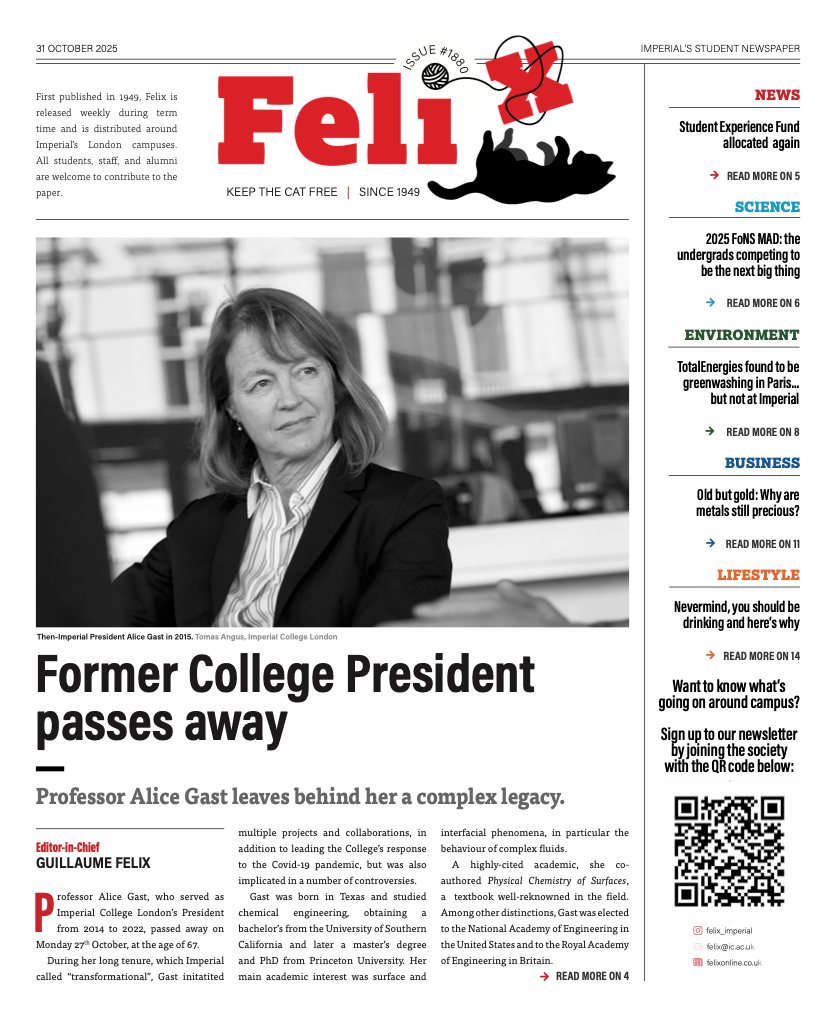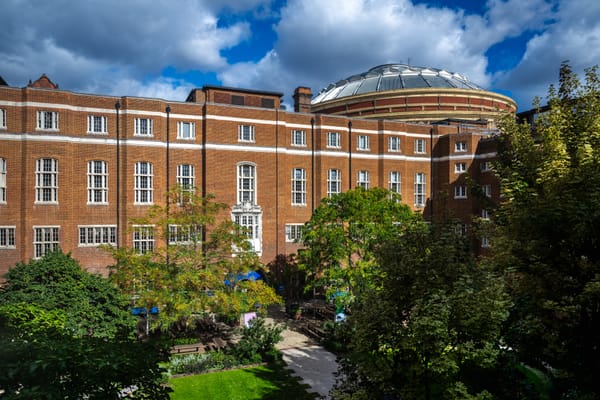Former Imperial College President passes away
Professor Alice Gast leaves behind her a complex legacy.
Professor Alice Gast, who served as Imperial College London’s President from 2014 to 2022, passed away on Monday 27th October, at the age of 67.
During her long tenure, which Imperial called “transformational”, Gast initiated multiple projects and collaborations, in addition to leading the College’s response to the Covid-19 pandemic, but was also implicated in a number of controversies.
Gast was born in Texas and studied chemical engineering, obtaining a bachelor’s from the University of Southern California and later a master’s degree and PhD from Princeton University. Her main academic interest was surface and interfacial phenomena, in particular the behaviour of complex fluids.
A highly-cited academic, she co-authored Physical Chemistry of Surfaces, a textbook well-renowned in the field. Among other distinctions, Gast was elected to the National Academy of Engineering in the United States and to the Royal Academy of Engineering in Britain.
Gast served as Vice-President for Research and Associate Provost at the Massachusetts Institute of Technology from 2001 to 2006, and then as President of Lehigh University in Pennsylvania from 2006 to 2014.
She was appointed President of Imperial in 2014, becoming the first woman to hold the Presidential office.
As President of Imperial, Gast oversaw the construction of the White City campus, the creation of Dyson School of Design Engineering, and the launch of the Cumbria Medical School.
Gast was outspoken about her belief in international values, and concerned about the harm that Brexit and geopolitical uncertainty could cause to Imperial. On the morning of the 2016 referendum result, she declared “Imperial is, and will remain, a European university.”
Having worked extensively abroad, notably acting as one of America’s three science envoys to Central Asia in 2010, Gast aimed to strengthen Imperial’s position as global and diverse institution, launching partnerships with research centres in Europe, Africa and America.
Yet her tenure as President of Imperial was overshadowed by highly publicised allegations of bullying and misconduct. A report drafted by a Queen’s Counsel lawyer in 2020 following an independent investigation found her and then-CFO Muir Sanderson reponsible for acts of “bullying” against a staff member, adding the pair had “created or contributed to a culture which involves and tolerates favouritism, exclusion, the making of disparaging comments about others and at times a lack of respect for others”.
Gast recognised she had “bullied someone” and apologised for it. But Imperial’s insistance on keeping the report private, until being forced to release its findings by a 2022 Information Commissioner’s Office decision, did little to appease anger among student and staff.
During her time in office, the former College President also faced criticism for her position as a board member of Chevron, an American oil and gas company involved in numerous controversies. Gast sat on the company’s Audit Committee from her appointment in 2012 until her passing. Chevron, believed to be responsible for the most cumulative climate pollution of any investor-owned company, was not retained in Imperial’s recent Zero Index, barring it from collaborations with the College.
Gast’s pay during her years at the head of Imperial was a source of controversy, too. Her total renumeration, which standing at £714,000 for the year 2021-22 was the highest of any university president in the country, drew the ire of staff unions at a time when the university had recently laid off employees, in the wake of the Covid pandemic.
The Union Council and University and College Union called for Gast’s resignation following the investigation. She was eventually replaced by Hugh Brady when her contract expired in 2022, and granted the title of Emeritus Professor of Chemical Engineering at Imperial College London.
Her passing followed a “long illness”, according to College President Hugh Brady, who paid homage to his predecessor in an obituary on Thursday 30th October.
“Alice was known for her towering intellect, with a unique ability to see beyond the barriers that tend to confine us – be they academic, geographic, political or societal. Her own research, which bridged many scientific fields, as well as her unwavering commitment to international collaboration, epitomised this spirit.
“Alice was driven always by clarity and purpose during a time of unprecedented challenge and change. Against the backdrop of a global pandemic, she took Imperial from strength to strength – guided by her belief that universities should be forces for good in the world. We all continue to feel the impact of her legacy – here at Imperial, and across the higher education sector. It has been a privilege to follow in her footsteps.”











